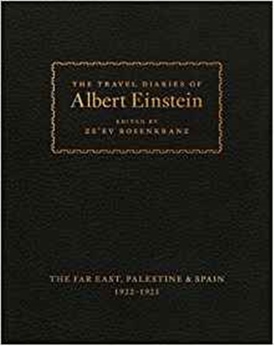Description
Albert Einstein’s travel diary to the Far East and Middle East In the fall of 1922, Albert Einstein, along with his then-wife, Elsa Einstein, embarked on a five-and-a-half-month voyage to the Far East and Middle East, regions that the renowned physicist had never visited before. Einstein's lengthy itinerary consisted of stops in Hong Kong and Singapore, two brief stays in China, a six-week whirlwind lecture tour of Japan, a twelve-day tour of Palestine, and a three-week visit to Spain. This handsome edition makes available the complete journal that Einstein kept on this momentous journey. The telegraphic-style diary entries record Einstein's musings on science, philosophy, art, and politics, as well as his immediate impressions and broader thoughts on such events as his inaugural lecture at the future site of the Hebrew University in Jerusalem, a garden party hosted by the Japanese Empress, an audience with the King of Spain, and meetings with other prominent colleagues and statesmen. Entries also contain passages that reveal Einstein's stereotyping of members of various nations and raise questions about his attitudes on race. This beautiful edition features stunning facsimiles of the diary's pages, accompanied by an English translation, an extensive historical introduction, numerous illustrations, and annotations. Supplementary materials include letters, postcards, speeches, and articles, a map of the voyage, a chronology, a bibliography, and an index. Einstein would go on to keep a journal for all succeeding trips abroad, and this first volume of his travel diaries offers an initial, intimate glimpse into a brilliant mind encountering the great, wide world.
About the Author
Special and general theories of relativity of German-born American theoretical physicistAlbert Einsteinrevolutionized modern thought on the nature of space and time and formed a base for the exploitation of atomic energy; he won a Nobel Prize of 1921 for his explanation of the photoelectric effect.His paper of 1905 formed the basis of electronics. His first paper, also published in 1905, changed the world.He completed his Philosophiae Doctor at the University of Zurich before 1909.Einstein, a pacifist during World War I, stayed a firm proponent of social justice and responsibility.Einstein thought thatNewtonionmechanics no longer enough reconciled the laws of classical mechanics with those of the electromagnetic field. This thought led to the development. He recognized, however, that he ably also extended the principle to gravitational fields and with his subsequent theory of gravitation in 1916 published a paper. He continued to deal with problems of statistical mechanics and quantum theory, which led to his explanations of particle theory and the motion of molecules. He also investigated the thermal properties of light, which laid the foundation of the photon.Best known for his mass–energy equivalence formulaE=mc2, dubbed "the world's most famous equation," he received "for his services to theoretical physics, and especially for his discovery of the law of the photoelectric effect". The latter was pivotal in establishing quantum theory.He visited the United States whenAdolf Hitlercame to power in 1933 and went not back to Germany. On the eve of World War II, he endorsed a letter, alertingFranklin Delano Roosevelt, president, to the potential development of "extremely powerful bombs of a new type" and recommending that the United States begin similar research. This recommendation eventually led to the Manhattan project. Einstein supported defending the Allied forces but largely denounced the idea of using the newly discovered nuclear fission as a weapon. Later, withBertrand Russell–Einstein manifesto highlighted the danger of nuclear weapons.After the rise of the Nazi party, Einstein made Princeton his permanent home as a citizen of United States in 1940. He chaired the emergency committee of atomic scientists, which organized to alert the public to the dangers of warfare.At a symposium, he advised:"In their struggle for the ethical good, teachers of religion must have the stature to give up the doctrine of a personal God, that is, give up that source of fear and hope which in the past placed such vast power in the hands of priests. In their labors they will have to avail themselves of those forces which are capable of cultivating the Good, the True, and the Beautiful in humanity itself. This is, to be sure a more difficult but an incomparably more worthy task... "("Science, Philosophy and Religion, A Symposium," published by the Conference on Science, Philosophy and Religion in their Relation to the Democratic Way of Life, Inc., New York, 1941).In a letter to philosopherEric Gutkind, dated 3 January 1954, Einstein stated:"The word god is for me nothing more than the expression and product of human weaknesses, the Bible a collection of honorable, but still primitive legends which are nevertheless pretty childish. No interpretation no matter how subtle can (for me) change this."(The Guardian, "Childish superstition: Einstein's letter makes view of religion relatively clear," by James Randerson, May 13, 2008)Great intellectual achievements and originality made the word "Einstein" synonymous with genius.The institute for advanced study in Princeton, New Jersey, affiliated Einstein until his death in 1955.More:http://en.wikipedia.org/wiki/Albert_E...http://www.nobelprize.org/nobe
